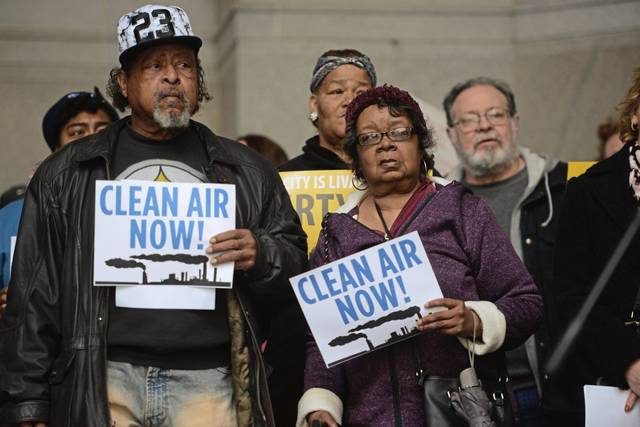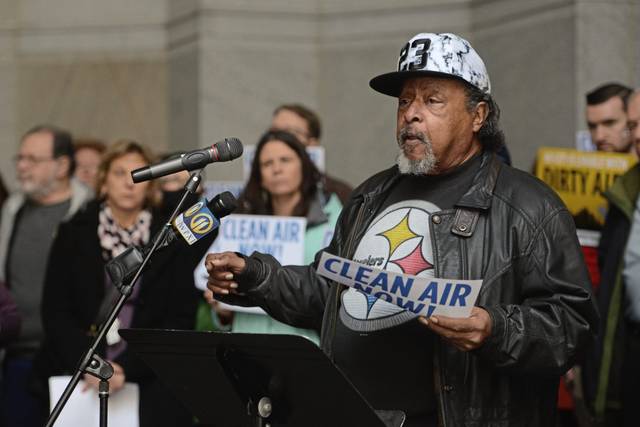About a year after a fire at the Clairton Coke Works knocked out pollution controls and heightened concerns over air quality in the region, residents from Clairton and across Allegheny County gathered at the City-County Building in Downtown Pittsburgh to urge the Allegheny County Health Department to do more to fight air pollution.
“If we don’t do something, the future of our kids is at stake,” said Pamela Lee, a resident of Clairton who grew up in North Braddock. “If we don’t do something, who will?”
Lee is a former smoker but said she quit after realizing the air quality was making it even harder to breathe. Bad smells and smoggy air hanging over her neighborhood keep her inside her Clairton home most of the time, and she hesitates to tell her 16-year-old son to go outside to play.
“I want to see my grandbabies,” Lee said. “And I want him to be alive to have them.”
Lee, 53, joined other county residents and air quality activists Friday for a rally before the bimonthly Allegheny County Board of Health Meeting.
They called on the county health department and board of health to step up their efforts to forecast and warn the public of bad air days connected to weather events. This follows a week of poor air quality at the end of December.
“ACHD cannot control the weather,” said Rachel Filippini, executive director of the Group Against Smog and Pollution, or GASP. “They cannot use the weather as an air pollution control tool. But they can control emissions.”
The health department announced plans last week to develop new pollution regulations for weather events called inversions — periods of drastic changes in temperature that trap pollutants close to the surface — and during periods of heavy fog and light wind.
The goal is for industry to have emissions reductions plans in place that could be implemented within 24 hours notice from the health department.
U.S. Steel announced Friday that it is offering to assist the health department with developing those forecasting tools.
“The company will do its fair share to propose actions that could have a measurable benefit during inversions and encourages ACHD to ensure that all members of the community contribute to regional air quality,” a statement from the company said.
Clairton Coke Works Plant Manager Mike Rhoades reiterated that commitment during Friday’s board of health meeting.
Filippini urged the health department to move forward with those plans. She also asked that the department work toward revising and strengthening the county’s coke oven emission regulations.
“This is necessary to combat the fugitive emissions we deal with every day, such as the hydrogen sulfide,” she said.
Residents and environmental activists addressed this issue during a rally held before the last board of health meeting in November.
Following Friday’s rally, the crowd moved to the first Allegheny County Board of Health meeting of the year, which was held blocks away at the health department offices on Fourth Avenue.
The standing room-only meeting included public comment from at least 20 speakers who live in communities throughout the county, including Clairton, Forest Hills, Franklin Park, Ross, Swissvale and West Mifflin, along with Pittsburgh neighborhoods including Lawrenceville and Squirrel Hill. All of them demanded immediate action on air quality.
But long-term fixes to air pollution, like changes to laws and regulations or executing enforcement orders, take months or years to complete, said Jim Kelly, deputy director of environmental health at the health department.
“We can’t speed up the regulatory,” Kelly said. “It is set by policy, or law, or regulation. So we can’t make these rules faster. That’s what’s frustrating. We can’t tell the public that, because they do deserve clean air now.”
He pointed to short-term solutions like working on the recently announced regulations and notification mechanisms for bad air quality days. But even what seems like a fairly simple tool takes time to develop, he said.
“When we have a new regulation that requires a facility to reduce emissions, we have to have really solid scientific technical evidence to support that,” Kelly said.
Dr. Lee Harrison, who on Friday was reelected as chairman of the board of health, said that the department’s lack of permanent leadership is not affecting its ability to enforce air quality standards.
“I don’t think that not having a director is altering our course right now,” Harrison said.
The department has been searching for a new director since Dr. Karen Hacker stepped down from the post in July.
The department’s deputy director of administration, Ronald A. Sugar, has served as interim director.
“We have challenges overall,” Harrison said of improving the region’s air quality. “Our trends are in the right direction.”
Dr. Edith Shapira, the board member leading the search committee, was not able to provide any updates on the search for a replacement during Friday’s meeting.
“The process is going full-steam ahead, we’re doing a lot of work,” Shapira said. “We just haven’t found our right match yet.”
Shapira said she hopes to provide more substantial updates at the next board meeting, scheduled for March 4 at 12:30 p.m. at the health department offices in Downtown Pittsburgh.















